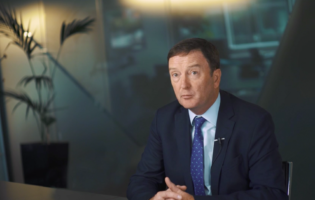Investment Outlook - Market Update

Investors entered 2024 with investor sentiment very positive, centered on expectations for 6 US interest rate cuts, materially lower inflation and no US recession. At KBI, we were less sanguine expecting all would not prove to be smooth-sailing and we expected periods of sentiment ‘flip-flopping’ where for example, once again the worry would be that inflation was too strong, or perhaps a period that growth is too weak. And now as the second quarter beckons, inflation and growth have indeed demonstrated to be too strong, and the happy investor consensus has rapidly repriced expectations to now 2 or max 3 rate cuts for 2024 with some even pondering no rate cuts!! Despite this change, risk assets have performed, turning a blind eye to the changed interest rate expectations and instead relying on hopes for better economic growth and earnings.
It is fascinating to note with global news headlines dominated by a ‘risks everywhere’ narrative, global stock-markets are on happy pills and paying little or no attention to risk. Behaviourally investors are displaying strong evidence of FOMO (fear of missing out) with momentum the big winner YTD . The trend is your friend…until it isn’t, and we note mean reversals do happen and are painful!
At KBI, our outlook remains less sanguine than consensus. The world politically and economically is not without risks, risks that lurk beneath the surface and are certainly not priced into markets we feel. Our view is that with less rate cuts to be expected and actual interest rates being higher for longer that growth will be slower than consensus expects and that an eventual mild recession (rather than soft landing) is still likely. We are also mindful that as 2024 progresses political risk will come into focus, with not just the US Presidential election but upwards of 40 elections scheduled globally. This causes us to be less bullish overall, more defensive in our positioning and suggests an expected market background against which risk assets could struggle.
From a secular perspective, we continue to re-iterate that despite the markets short-term focus that we are in a period of ‘regime change’. A regime where its likely to be a world where 2% inflation is a floor rather than the ceiling and where higher rather than lower interest rates and bond yields should be expected as the norm.
Asset class outlook:
Equities
As happened during 2023, the market returns YTD in 2024 have generally exceeded earnings growth, and as a result, market valuations are now at an aggregate level trading above historic averages and cannot be described as cheap. While momentum sentiment and hope for a better future can drive such re-ratings, eventually fundamentals do matter and for 2024 as a whole, markets should be more driven by fundamentals than hype.
I do note a broadening of the rally over recent weeks away from the momentum driven US dominated Magnificent 7 names towards more cyclical sectors and including regions such as Europe and Japan. Indeed, a fragmentation has begun across these 7 names themselves with the likes of Tesla suffering while Nvidia has been the dominant winner YTD. We highlight that within equity markets there are large valuation disparities with excessive valuations in growthier sectors such as the artificial intelligence names compared to very attractive entry points for value or higher yielding sectors, such as utilities for example. Our economic scenario of a likely mild recession and avoiding a hard landing should be a catalyst for a rotation and broadening of performance across the market an environment that should suit good stock picking.
At a regional level we continue to note that the North American equity market in aggregate looks the most expensive compared to history. In contrast, European and the strongly out of favour Emerging Market equity markets look much more attractively valued.
Bonds
Bonds as an asset class have experienced two difficult back-to-back years of performance during 2022 & 2023 and have struggled again YTD. This is not a surprise to those of us who have believed in regime change and the need for bond yields to be and remain higher and away from the emergency levels of the deflationary era. Noting that the aggressive central bank rate rising environment is now behind us the outlook is less hostile. That said, we aren’t particularly bullish on the outlook for bonds, noting yield levels that are more fairly valued to us, than cheap. It is also worth highlighting that bond and equity markets have de-coupled from each other YTD
Risk wise, we continue to monitor corporate bond markets for any signs of distress at a company or indeed sectoral level. We watch spreads that to date have shown very little if any signs of stress. That said with risks lurking they could be vulnerable in the period ahead
Disclaimers:
KBI Global Investors Ltd is regulated by the Central Bank of Ireland. Please note that, as of 1 January 2023, KBI Global Investors Ltd. has withdrawn from the UK’s Temporary Permissions Regime (the “TPR”) on the basis that the firm is availing of an exclusion available for overseas persons. KBI Global Investors (North America) Ltd is a registered investment adviser with the SEC and regulated by the Central Bank of Ireland. KBI Global Investors (North America) Ltd is a wholly-owned subsidiary of KBI Global Investors Ltd. ‘KBI Global Investors’ or ‘KBIGI’ refer to KBI Global Investors Ltd and KBI Global Investors (North America) Ltd.
Under MiFID II this is deemed marketing material and should not be regarded as investment research. This material is provided for informational purposes only and does not constitute an offer to sell or the solicitation of an offer to purchase any security, product or service including any group trust or fund managed by KBI Global Investors. The information contained herein does not set forth all of the risks associated with this strategy, and is qualified in its entirety by, and subject to, the information contained in other applicable disclosure documents relating to such a strategy. KBI Global Investors’ investment products, like all investments, involve the risk of loss and may not be suitable for all investors, especially those who are unable to sustain a loss of their investment.
PAST PERFORMANCE IS NOT NECESSARILY INDICATIVE OF FUTURE RESULTS.
This introductory material may not be reproduced or distributed, in whole or in part, without the express prior written consent of KBI Global Investors. The information contained in this introductory material has not been filed with, reviewed by or approved by any regulatory authority or self-regulatory authority and recipients are advised to consult with their own independent advisors, including tax advisors, regarding the products and services described therein. The views expressed are those of KBI Global Investors and should not be construed as investment advice. We do not represent that this information is accurate or complete and it should not be relied upon as such. Opinions expressed herein are subject to change without notice. The products mentioned in this Document may not be eligible for sale in some states or countries, nor suitable for all types of investors. Past performance may not be a reliable guide to future performance and the value of investments may fall as well as rise. Investments denominated in foreign currencies are subject to changes in exchange rates that may have an adverse effect on the value, price or income of the product. Income generated from an investment may fluctuate in accordance with market conditions and taxation arrangements. In some tables and charts, due to rounding, the sum of the individual components may not appear to be equal to the stated total(s). Additional information will be provided upon request. Performance for periods of more than 1 year is annualized. Gross results shown do not show the deduction of investment management fees. A client’s actual return will be reduced by the management fees and any other expenses which may be incurred in the management of an investment account. For example, a €1,000,000 investment with an assumed annual return of 5% with a management fee of 0.85% would accumulate €8,925 in fees during the first year, €48,444 in fees over five years and €107,690 in fees over ten years.




